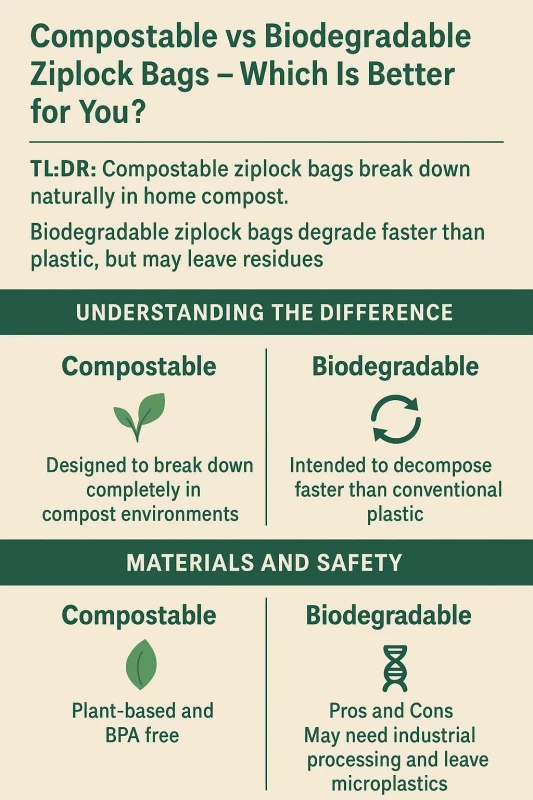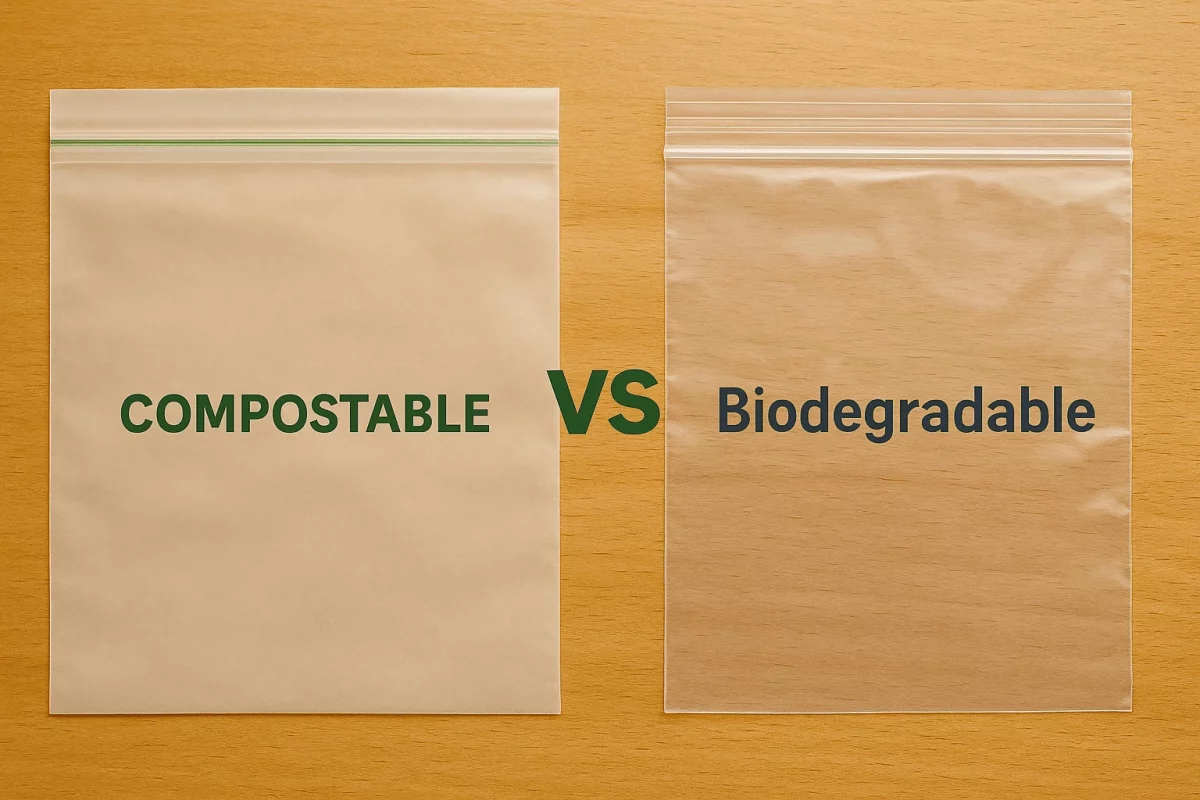Compostable And Biodegradable
Compostable vs Biodegradable Ziplock Bags – Which Is Better for You?
TL;DR: Compostable ziplock bags are made from renewable plant-based materials and break down into safe, natural elements in compost. Biodegradable bags degrade faster than plastic, but often leave residue or need industrial processing. For UK households, compostable bags are the cleaner, more sustainable choice.
Boring Basics and the Push for Greener Storage
For UK households trying to live plastic-free, choosing the right resealable storage matters. At Boring Basics, we believe sustainable swaps should be simple, safe, and transparent.
Compostable ziplock bags and biodegradable ziplock bags both claim to be eco-friendly, but they perform very differently once discarded. Understanding the difference helps you choose products that truly protect the planet.
Understanding the Difference
What Does Compostable Mean?
Compostable ziplock bags are made from renewable plant-based biopolymers such as PLA (polylactic acid) and PBAT (polybutylene adipate terephthalate). These materials come from sources like corn starch or sugarcane.
When placed in a composting environment, they break down into water, carbon dioxide, and nutrient-rich compost — nothing harmful remains.
Certified compostable bags meet EN13432 standards or carry the OK Compost Home logo, meaning they decompose safely in either industrial or home compost.
Our main guide on compostable ziplock bags explains these materials in detail and how they compare to conventional plastics.
What Does Biodegradable Mean?
Biodegradable ziplock bags are designed to break down faster than plastic, but the term is broad and often misleading. Many are made from traditional plastics mixed with chemical additives that make them fragment more quickly when exposed to oxygen, sunlight, or microbes.
However, fragmentation isn’t the same as decomposition. These bags often leave behind microplastics and require industrial processing to degrade properly. Most UK council composting systems do not accept them, meaning they end up in general waste.
The result: biodegradable bags may look greener, but their impact is far less sustainable.
Materials and Food Safety
Compostable packaging in the UK, including Boring Basics’ ziplock bags, is BPA-free, plastic-free, and made entirely from renewable resources. It’s safe for direct food contact, free of toxins, and suitable for both hot and cold storage.
Biodegradable bags, on the other hand, can still contain petrochemical polymers. Even if they degrade faster, they’re not guaranteed to be BPA-free or suitable for composting at home.
If you’re storing food, fresh produce, or snacks, compostable is always the safer, cleaner choice.
Environmental Impact: The Real Difference
Compostable Bags – Circular and Responsible
Compostable ziplock bags return safely to the earth. Once they decompose, they enrich the soil instead of polluting it. For UK homes with compost bins, it’s a straightforward, closed-loop system: use, reuse, compost.
They help cut landfill waste, reduce greenhouse gas emissions, and eliminate microplastic pollution.
Biodegradable Bags – Limited Progress
Biodegradable ziplock bags degrade faster than standard plastics, but they don’t disappear completely. In landfills or low-oxygen conditions, they break apart but leave behind small plastic particles.
They can also generate methane if they decompose anaerobically (without oxygen), offsetting much of the claimed environmental benefit.
A report from WRAP UK found that compostable packaging delivers greater long-term environmental gains when properly disposed of, while biodegradable plastics offer only partial solutions.
Everyday Uses for Greener Living
Both types of resealable bags are useful for home organisation and food storage. The difference lies in what happens next.
Compostable bags are ideal for:
- Leftovers, snacks, sandwiches, and fruit
- Freezer use (short term)
- Marinating food
- Organising travel items, craft materials, or small parts
Our 15×13 cm compostable ziplock bags are great for small snacks and toiletries. The 18×19 cm size suits larger portions or meal prep.
You can wash and reuse each bag several times before composting it, keeping your storage practical and plastic-free.
Disposal in the UK
Compostable Bags
If your compostable ziplock bags are labelled home compostable, add them directly to your garden compost heap or food waste bin. They’ll decompose naturally within 6–12 months.
Many UK councils now accept certified compostable packaging in food waste collections. Always check your local authority’s policy on the GOV.UK council finder.

Biodegradable Bags
Biodegradable bags should not go in home compost or recycling bins unless explicitly accepted by your local waste system. Most are treated as general waste and will not decompose effectively in a landfill.
The Bottom Line
For most households, home compostable bags are easier to manage and far more sustainable than biodegradable ones. They align with the UK’s composting goals and work safely within domestic waste systems.
Key Takeaways
- Compostable ziplock bags break down into safe, natural materials and support a true circular waste cycle.
- Biodegradable bags degrade faster than plastic, but can still cause microplastic pollution.
- Always check for BPA-free and certified compostable labels before buying.
- For reliable, eco-friendly food storage, compostable bags are the better long-term choice.
Related Reading
For more detail on how compostable bags work and their environmental benefits, read our full guide:
Compostable Ziplock Bags – Eco-Friendly Resealable Storage for Every Home
You can also explore:
Both are BPA-free, compostable bags, fully plastic-free, and designed for UK households focused on sustainable living.
Frequently Asked Questions
Yes. Compostable bags decompose completely into natural elements, while biodegradable ones may leave plastic residue.
Yes, if your council accepts certified compostable packaging. Check your local authority’s policy first.
Yes. Certified compostable bags are BPA free and safe for direct food contact.
In home compost, 6–12 months. In industrial composting, 8–12 weeks
Try Compostable Ziplock Bags from Boring Basics
Ready to switch to storage that’s safe for you and the planet? Boring Basics offers home compostable, plastic-free resealable bags made from renewable materials. They’re durable, leak-resistant, and 100% guilt-free.
Shop now and make your kitchen truly sustainable:
Compostable Ziplock Bags – 15×13 cm
Compostable Ziplock Bags – 18×19 cm
Every pack helps reduce plastic waste across UK homes, one bag at a time.

